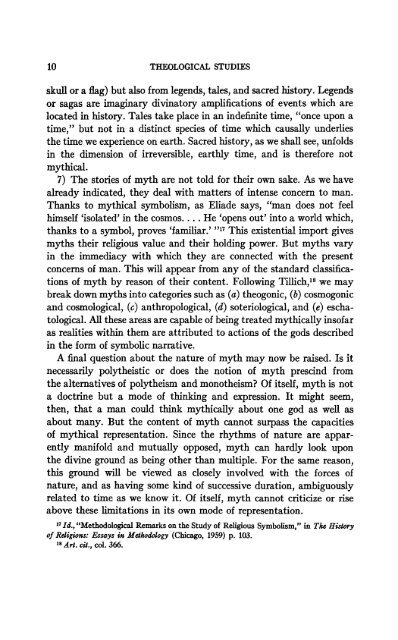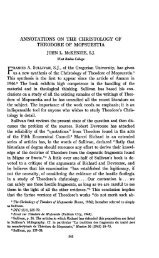SYMBOL, MYTH, AND THE BIBLICAL REVELATION AVERY ...
SYMBOL, MYTH, AND THE BIBLICAL REVELATION AVERY ...
SYMBOL, MYTH, AND THE BIBLICAL REVELATION AVERY ...
You also want an ePaper? Increase the reach of your titles
YUMPU automatically turns print PDFs into web optimized ePapers that Google loves.
10 <strong>THE</strong>OLOGICAL STUDIES<br />
skull or a flag) but also from legends, tales, and sacred history. Legends<br />
or sagas are imaginary divinatory amplifications of events which are<br />
located in history. Tales take place in an indefinite time, "once upon a<br />
time," but not in a distinct species of time which causally underlies<br />
the time we experience on earth. Sacred history, as we shall see, unfolds<br />
in the dimension of irreversible, earthly time, and is therefore not<br />
mythical.<br />
7) The stories of myth are not told for their own sake. As we have<br />
already indicated, they deal with matters of intense concern to man.<br />
Thanks to mythical symbolism, as Eliade says, "man does not feel<br />
himself 'isolated' in the cosmos. ... He 'opens out' into a world which,<br />
thanks to a symbol, proves 'familiar.' " 17 This existential import gives<br />
myths their religious value and their holding power. But myths vary<br />
in the immediacy with which they are connected with the present<br />
concerns of man. This will appear from any of the standard classifications<br />
of myth by reason of their content. Following Tillich, 18 we may<br />
break down myths into categories such as (a) theogonic, (b) cosmogonic<br />
and cosmological, (c) anthropological, (d) soteriological, and (e) eschatological.<br />
All these areas are capable of being treated mythically insofar<br />
as realities within them are attributed to actions of the gods described<br />
in the form of symbolic narrative.<br />
A final question about the nature of myth may now be raised. Is it<br />
necessarily polytheistic or does the notion of myth prescind from<br />
the alternatives of polytheism and monotheism? Of itself, myth is not<br />
a doctrine but a mode of thinking and expression. It might seem,<br />
then, that a man could think mythically about one god as well as<br />
about many. But the content of myth cannot surpass the capacities<br />
of mythical representation. Since the rhythms of nature are apparently<br />
manifold and mutually opposed, myth can hardly look upon<br />
the divine ground as being other than multiple. For the same reason,<br />
this ground will be viewed as closely involved with the forces of<br />
nature, and as having some kind of successive duration, ambiguously<br />
related to time as we know it. Of itself, myth cannot criticize or rise<br />
above these limitations in its own mode of representation.<br />
17 Id., "Methodological Remarks on the Study of Religious Symbolism," in The History<br />
of Religions: Essays in Methodology (Chicago, 1959) p. 103.<br />
18 Art. cit. t col. 366.
















